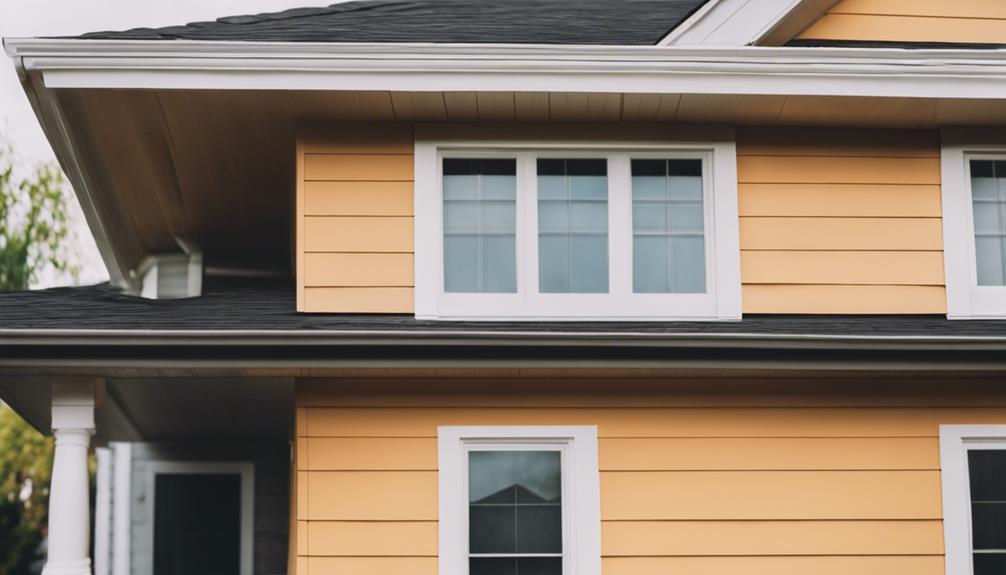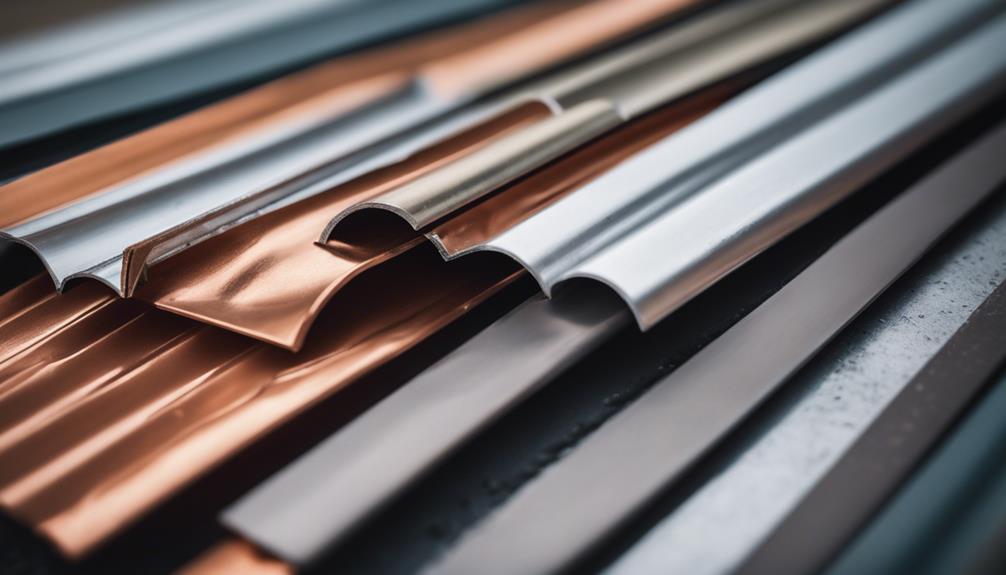Choosing the Right Materials for Gutter Replacement
In the realm of gutter replacement, the choice of materials is paramount for optimal performance—discover the key factors that can help you make the right decision.
When it comes to replacing gutters, the selection of materials is a critical decision that directly impacts the effectiveness and longevity of a property's drainage system. The market offers a range of options, each with its own set of advantages and drawbacks.
From the lightweight and rust-resistant aluminum to the sturdy steel and low-maintenance vinyl, the choices can seem overwhelming. Understanding the nuances of these materials and how they align with specific needs can lead to a successful gutter replacement project.
Let's explore the key considerations that can guide homeowners and contractors towards making informed decisions for best gutter performance.
Overview of Available Gutter Materials
When considering gutter replacement materials, it is important to have a thorough understanding of the various options available in the market. The most common materials used for gutters are aluminum, vinyl, steel, and copper. Aluminum gutters are lightweight, easy to install, and rust-resistant, making them a popular choice for many homeowners.
Vinyl gutters are cost-effective and easy to maintain but may not be as durable as metal options. Steel gutters are strong and can withstand harsh weather conditions, but they are prone to rust if not properly maintained. Copper gutters are known for their durability and aesthetic appeal, as they develop a patina over time that adds character to a home's exterior.
Each material has its own set of advantages and considerations, so it is essential to weigh these factors carefully before making a decision. Factors such as climate, budget, maintenance requirements, and aesthetic preferences should all be taken into account when selecting the most suitable gutter material for a specific property.
Pros and Cons of Aluminum Gutters
Having discussed an overview of available gutter materials, it is pertinent to examine the pros and cons of aluminum gutters for homeowners looking to make an informed decision on their gutter replacement options.
Pros of Aluminum Gutters:
- Durability: Aluminum gutters are resistant to rust and can last for up to 20 years with proper maintenance.
- Lightweight: Easy to install due to their lightweight nature, making them a popular choice for DIY projects.
- Low Maintenance: They require minimal upkeep, mainly occasional cleaning to remove debris.
Cons of Aluminum Gutters:
- Susceptible to Dents: Aluminum gutters can dent more easily than other materials, especially when hit by heavy objects like tree branches.
- Higher Cost: While not as expensive as copper or steel, aluminum gutters are pricier than vinyl options.
- Painting: The paint on aluminum gutters can fade over time, requiring repainting to maintain their appearance.
Pros and Cons of Vinyl Gutters

Vinyl gutters, a popular alternative to traditional materials like aluminum, offer distinct advantages and disadvantages for homeowners contemplating gutter replacement options.
One of the main benefits of vinyl gutters is their affordability. They are typically cheaper than aluminum or steel gutters, making them an attractive option for budget-conscious individuals. Additionally, vinyl gutters are lightweight and easy to install, making them a good choice for DIY enthusiasts.
However, there are some drawbacks to take into account. Vinyl gutters are not as durable as metal options and may crack or break over time, especially in extreme weather conditions. They are also prone to fading and becoming brittle when exposed to prolonged sunlight, which can impact their lifespan. Regarding aesthetics, vinyl gutters may not offer the same level of curb appeal as metal gutters.
Ultimately, when deciding whether vinyl gutters are the right choice for your home, it's important to weigh the cost savings against the potential need for more frequent replacements and repairs.
Pros and Cons of Steel Gutters
Steel gutters, known for their durability and strength, are a popular choice among homeowners seeking a reliable gutter replacement option. Steel gutters have distinct advantages and disadvantages that should be considered before making a decision:
- Pros:
- Durability: Steel gutters are highly durable and can withstand harsh weather conditions, making them a long-lasting option.
- Strength: They are strong and can bear the weight of snow, debris, and even the occasional wildlife that may find its way onto your roof.
- Fire Resistance: Steel gutters are non-combustible, adding an extra layer of safety to your home.
- Cons:
- Prone to Rust: Without proper maintenance, steel gutters can be susceptible to rust and corrosion over time.
- Weight: Steel gutters are heavier than other materials, requiring professional installation and potentially additional support for the added weight.
- Cost: While durable, steel gutters tend to be more expensive upfront compared to other materials like vinyl or aluminum.
Considering these factors can help you determine if steel gutters are the right choice for your home.
Tips for Selecting the Best Material

When considering the best material for gutter replacement, it is essential to evaluate factors such as durability, maintenance requirements, and cost-effectiveness to make an informed decision tailored to your home's specific needs.
Aluminum gutters are lightweight, rust-resistant, and easy to install, making them a popular choice for many homeowners. They require minimal maintenance and come in various colors to match your home's exterior.
Copper gutters offer a high-end, elegant look, are durable, and develop a natural patina over time. However, they are expensive and may require professional installation.
Vinyl gutters are affordable, easy to install, and do not rust or corrode. On the downside, they can become brittle in extreme temperatures and may crack or break.
Stainless steel gutters are sturdy, long-lasting, and suitable for harsh weather conditions. They are more expensive than aluminum but offer superior durability. Ultimately, the best material for your gutter replacement will depend on your budget, aesthetic preferences, and maintenance capabilities.
Frequently Asked Questions
Are There Any Environmentally-Friendly Options for Gutter Materials?
Yes, environmentally-friendly options for gutter materials include steel, aluminum, and copper. These materials are recyclable, durable, and can be repurposed. They have minimal impact on the environment and are suitable choices for sustainable gutter replacement projects.
How Do Different Gutter Materials Hold up in Extreme Weather Conditions?
Different gutter materials respond variably to extreme weather. Aluminum is lightweight and resists corrosion, ideal for most conditions. Steel is robust but prone to rust. Copper is durable but costly. Vinyl may warp in extreme heat. Consider climate and budget for best performance.
What Maintenance Is Required for Each Type of Gutter Material?
Maintenance for each type of gutter material varies. Regular cleaning is essential for all materials. Metal gutters may need rust prevention treatments. Vinyl gutters require periodic checks for cracks. Copper gutters may need polishing to maintain their appearance.
Can Gutter Materials Impact the Overall Aesthetic of a Home?
Gutter materials play a significant role in enhancing a home's aesthetic appeal. The choice of materials such as copper, aluminum, or steel can impact the overall appearance. Selecting a material that complements the architectural style can elevate the visual appeal of the property.
Are There Any Specific Warranties or Guarantees Associated With Certain Gutter Materials?
Certain gutter materials come with warranties or guarantees to ensure product quality and performance. Aluminum gutters may have warranties against corrosion, while copper gutters often come with guarantees for longevity and weather resistance, providing additional peace of mind for homeowners.